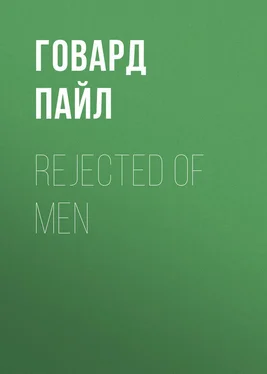Говард Пайл - Rejected of Men
Здесь есть возможность читать онлайн «Говард Пайл - Rejected of Men» — ознакомительный отрывок электронной книги совершенно бесплатно, а после прочтения отрывка купить полную версию. В некоторых случаях можно слушать аудио, скачать через торрент в формате fb2 и присутствует краткое содержание. Жанр: foreign_antique, foreign_prose, на английском языке. Описание произведения, (предисловие) а так же отзывы посетителей доступны на портале библиотеки ЛибКат.
- Название:Rejected of Men
- Автор:
- Жанр:
- Год:неизвестен
- ISBN:нет данных
- Рейтинг книги:3 / 5. Голосов: 1
-
Избранное:Добавить в избранное
- Отзывы:
-
Ваша оценка:
- 60
- 1
- 2
- 3
- 4
- 5
Rejected of Men: краткое содержание, описание и аннотация
Предлагаем к чтению аннотацию, описание, краткое содержание или предисловие (зависит от того, что написал сам автор книги «Rejected of Men»). Если вы не нашли необходимую информацию о книге — напишите в комментариях, мы постараемся отыскать её.
Rejected of Men — читать онлайн ознакомительный отрывок
Ниже представлен текст книги, разбитый по страницам. Система сохранения места последней прочитанной страницы, позволяет с удобством читать онлайн бесплатно книгу «Rejected of Men», без необходимости каждый раз заново искать на чём Вы остановились. Поставьте закладку, и сможете в любой момент перейти на страницу, на которой закончили чтение.
Интервал:
Закладка:
“Ah! Then you are not even a prophet?” said Dr. Caiaphas.
“No.”
“Who are you, then?” said Dr. Caiaphas; “and what are you? Tell us who you are, that we may give an answer to them that sent us.” He tried not to feel the absurdity of the situation, but some of the other clergymen laughed.
John turned up his face and looked almost directly into the dazzling light of the sun above. He raised his lean arms, with his hands outspread and his fingers stretched wide open. “I am,” he cried, in a loud voice, “the voice of one crying in the wilderness: Make straight the way, as said Isaiah, the prophet.”
Again two or three of the committee laughed. The disciples of John looked sullenly at them, but the Baptist himself paid no attention to them.
“Then, let me understand,” said Dr. Caiaphas, speaking also in a loud voice so that all might hear–“then, let me understand just what it is you have to say for yourself. Let me hear just what is your claim, for it is for that reason that we have come hither. What I want to understand, and what all these poor people here should clearly understand, is this: If you are not the Christ–and you yourself say you are not–nor such a one as Elijah, nor one having authority to preach, as the saints of the Church had authority–if you are only a voice preaching in the wilderness, by what right do you, then, baptize and grant remission of sins? By what authority do you, then, forgive men their sins?”
John, still with eyes uplifted and with hands outspread, cried out: “I baptize with water, but in the midst of you there stands one whom you know not, whose shoes I am not worthy to bear.” Other words he uttered, as uncomprehendable to the clergymen as these. He still held his arm upraised and his hand outspread for a little. Then he ended suddenly, and as suddenly let his hand fall from his knee, and sat looking about him as though to see what effect his words had upon those who heard them. One of the committee laid his hand upon Dr. Caiaphas’s arm. “Do you not see that it is useless to waste time here?” said he. “What good can come of it, doctor? It is plain to me that the man is mad. Any one with eyes to see and ears to hear may see and hear that for himself. Mr. Hicks tells us that the up-train will be due in twenty-five minutes. We have just comfortable time to make it. If we miss it, we’ll have to wait till five o’clock, and not get into town till after dark. I am sure that I, for one, have seen enough to convince me of the man’s insanity without listening any further to what he has to say.”
Dr. Caiaphas looked at his watch. “Well,” he said, reluctantly, “I suppose we might as well return. I would like to have heard him preach to the multitude, though, and to see how he baptizes them. However, I quite agree with you that he is not right in his mind, and I suppose it would be only a mere matter of curiosity to remain longer.”
If Dr. Caiaphas had on his way down from New York feared that he was on a fool’s errand, he was, indeed, certain of it now. He did not say anything until the committee was on its way back to the station in the hack. Then he spoke.
“I am sorry, gentlemen, that I should have brought you all the way down here only for this. I am afraid”–with a smile–“that the committee did not get much satisfaction from the interview.”
Mr. Munjoy laughed. “I am sure,” he said, “that we are all very glad to have suffered a little inconvenience to have satisfied Dr. Caiaphas.”
The words were good-natured enough, but they made Dr. Caiaphas still more uncomfortable. “Indeed,” he said, “I am glad to be satisfied, but that was not exactly my object in bringing you all down here. I am sorry that you have taken a journey that is uncomfortable to yourselves only to satisfy me.”
“Oh, that’s all right,” said Mr. Munjoy, laughing. “This time to-morrow we’ll have ceased to think anything about the inconveniences of to-day. I am sure many of us have squandered a half-day ever so much more uselessly than this.”
Then there was nothing more said.
Thus I have endeavored to describe that incident as nearly as possible as it occurred. Since then a sentimental lustre has arisen to envelop it, and the world has come to accept it that those priests and Levites were blind in that they did not at once see the truth. But I think intelligent humanity will agree that it was impossible for the priests and Levites among us to accept the divine truth in such an astonishing guise as that which they then beheld.
It is entirely true that God moves ever in ways incomprehensible to the finite mind. His wisdom is not according to our wisdom, nor His order according to our order. But it cannot be possible that He expects us, scribes and pharisees, whom He has endowed with intelligence and reason, to accept that which was so unintelligent and so unreasonable. If He endows us with reason, He cannot expect us to accept that which is unreasonable. Who is there of our class to-day who would not have revolted against the baptism of John when it was first instituted?
IT is necessary here, and at another place, to introduce an interlude into the story. These interludes are designed as threads to connect the different parts of the narrative together. They are each a suggestion instead of a description; for even a description of things holy would too much shock the sense of propriety of us scribes and pharisees.
For the accepted religion of the civilized world has become so enveloped with wrappings of spiritual ideality that it is impossible to strip away those investments and to show the reality in all its nakedness. Such an exposure would too much violate our accepted religious ideas. It would not do for any man to tell just how it was that Christ actually did appear in the midst of that motley multitude; nor would it do for any pharisee among us to listen to the story.
Either the truth would sound blasphemous, or else, if it were accepted and received, then we scribes and pharisees, priests and Levites of to-day would rise up and stone it and crucify it exactly as we did of old.
Since those times we have grown accustomed to say that we believe in Christ–even though we do not really believe. Expressed belief and real belief are very different matters. What we think we believe in is not the living Christ as He was in the flesh, but a Christ we have created for ourselves–a white-robed, visionary figure that passes through the world of humanity like a spirit rather than like a man of flesh and blood.
For the story of Christ is surrounded by the narrative of such incredibly miraculous happenings that it is necessary for us to create such a spiritual image, or else we cannot believe those narratives at all. It is with us now as it was in those ages past–we cannot bear to have the spiritual image of truth blasphemed by the living fact. In our souls we disbelieve that which seems to us to be unbelievable. We endeavor to stimulate faith, first by saying that we believe, and then by creating for ourselves an imaginary image of Christ who might have performed the miracles if He had really lived.
Nearly all intelligent and thoughtful men really do believe in the existence of an infinitely intelligent and infinitely powerful deity.
For a man has but to gaze about him and he beholds, with the eyes of his flesh, infinity itself–infinity of what is great; infinity of what is minute; infinity of time; infinity of space.
These are actual entities, for we know that there never was and never can be a time in which there was no created thing–not even vacuum–and we know that there can be no limit to space in which everything–even space itself–ceases to exist. The very material universe exists infinitely, and we behold with the eyes of the flesh. We do not comprehend it, yet we know that it really is.
Читать дальшеИнтервал:
Закладка:
Похожие книги на «Rejected of Men»
Представляем Вашему вниманию похожие книги на «Rejected of Men» списком для выбора. Мы отобрали схожую по названию и смыслу литературу в надежде предоставить читателям больше вариантов отыскать новые, интересные, ещё непрочитанные произведения.
Обсуждение, отзывы о книге «Rejected of Men» и просто собственные мнения читателей. Оставьте ваши комментарии, напишите, что Вы думаете о произведении, его смысле или главных героях. Укажите что конкретно понравилось, а что нет, и почему Вы так считаете.












